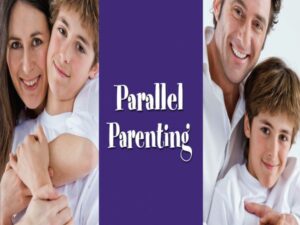If you’re considering or have already started parallel parenting, you may have a lot of questions. What is it? How does it work? What are the risks? In this blog post, we’ll answer all of those questions and more. We’ll provide an introduction to parallel parenting, discuss the symptoms of parallel parenting, describe the three types of parallel parenting, and explain how parallel parenting works. We’ll also look at the risks associated with this approach and offer some alternatives if you’re not comfortable with this way of raising children.
Contents
- 1 What Is Parallel Parenting?
- 2 Types Of Parallel Parenting
- 3 How Does Parallel Parenting Work?
- 4 Benefits Of Parallel Parenting
- 5 Drawbacks Of Parallel Parenting
- 6 Risks Of Parallel Parenting
- 7 Alternatives To Parallel Parenting
- 8 Tips To Do Parallel Parenting Successfully
- 9 Conclusion
- 10 A Word From Therapy Mantra
What Is Parallel Parenting?
 Parallel parenting is a form of child custody where parents arrange to have their children spend time with each one separately, without the other parent present. The idea behind this arrangement is that when parents are together they may argue or fight in front of their children and make them feel stressed out or sad; by separating, those unpleasant feelings can be avoided.
Parallel parenting is a form of child custody where parents arrange to have their children spend time with each one separately, without the other parent present. The idea behind this arrangement is that when parents are together they may argue or fight in front of their children and make them feel stressed out or sad; by separating, those unpleasant feelings can be avoided.
Types Of Parallel Parenting
There are three main types of parallel parenting arrangements:
- Supervised visitation
- Limited contact parenting
- High conflict co-parenting (HCCP)
Each type has its own set of rules for how often parents should see their children, what they’re allowed to do with them during those visits, etcetera.
Supervised Visitation
Supervised visitation is the safest type of parallel parenting because it ensures that your child will always be in good hands with someone who cares about their well-being. In this case, a third party (such as another family member or friend) will supervise all visits between parent and child so there’s no risk for abuse or neglect.
Limited Contact Parenting
In a limited contact parenting arrangement, the parents are still allowed to see each other but they’re not allowed to be around one another when their children are present. This type of parallel parenting is often used when there’s been violence or abuse in the home or when one parent fears for their safety around the other.
High Conflict Co-Parenting (HCCP)
Parents in HCCP are allowed to see each other when their children are present so long as they agree not to discuss anything that may cause conflict between them. This type of parallel parenting is often used when there’s been violence or abuse in the home or when one parent fears for their safety around the other.
How Does Parallel Parenting Work?

Parallel parenting is a way of raising children in which parents are separated from each other and only see their kids during specific times that they’ve agreed upon ahead of time; these visits usually take place at either parent’s home, but sometimes one parent will travel to the other’s home to see their children. In this type of arrangement, parents are not allowed to communicate with each other outside of these specific times; any conflict or disagreements must be resolved during the visit.
Benefits Of Parallel Parenting
There are many benefits to parallel parenting. When parents are separated, they’re less likely to fight in front of their children, which can be very beneficial for the kids’ mental health. This arrangement can also help children feel more secure and stable because they know that their parents will never fight in front of them. Additionally, when parents are separate, it’s easier for them to focus on their own lives and not worry about the drama that goes on between their ex-partners. Lastly, parallel parenting can help children learn how to problem solve and resolve conflict.
Parents Are Less Likely To Fight Infront Of Children
When parents are together, they’re more likely to argue or fight in front of their children. This can be extremely damaging for the kids and can cause them to feel stressed out, anxious, and sad. By separating the parents, those unpleasant feelings can be avoided.
Children Feel More Secure And Stable

When parents are together, there’s always the potential for drama and conflict. This can be very destabilizing for children, who crave stability and security. When parents are separated, it’s easier for them to provide that stability for their kids.
Children Can Learn How To Resolve Conflict
In a parallel parenting arrangement, children have the opportunity to see their parents resolve conflict in a healthy way. This can be extremely beneficial for their development and can help them learn how to communicate effectively with others. It’s also important for children to see that not all relationships end in divorce; sometimes, people are able to work through their problems and stay together.
Parents Can Focus On Their Own Lives
When parents are together, they often spend more time worrying about their partner than themselves. This can be very unhealthy and counterproductive. By separating the parents, it’s easier for them to focus on their own lives and not worry about what’s going on with their ex-partners.
Can Help Children Cope With Divorce
When children’s parent’s divorce, it can be a very difficult and confusing time for them. Parallel parenting can help ease the transition by providing stability and security. Additionally, parallel parenting can help children learn how to problem solve and resolve conflict. If you’re considering this type of arrangement, it’s important to speak with a lawyer or mental health professional to make sure that it’s the right decision for your family.
Drawbacks Of Parallel Parenting

Despite the many benefits of parallel parenting, there are also a few drawbacks to consider. One of the biggest problems with this type of arrangement is that it can be difficult for children to maintain relationships with both parents. Additionally, if one parent is not following the agreement, it can be very confusing and frustrating for the child. Additionally, parallel parenting can sometimes lead to more conflict between the parents since they’re not able to communicate outside of the visits. Lastly, this type of arrangement can be expensive and time-consuming.
Difficult for children to maintain relationships with both parents
One of the drawbacks of parallel parenting is that it can be difficult for children to maintain relationships with both parents. This is because the parents are not living together and they may not see each other very often. It’s important to try to schedule regular visits so that the child can maintain a relationship with both parents.
Can be very confusing and frustrating for the child
If one parent is not following the agreement, it can be confusing for the child. If one of the parents is not following the agreement, it can be difficult for the child to know what’s going on and who they should be listening to. It’s important to have a clear agreement in place so that both parents are aware of their responsibilities.
Leads To More Conflict Between Parents
Since the parents are not living together, it’s easy for them to conflict with each other. This can lead to more bitterness and anger between the parents. It’s important to try to communicate as much as possible so that you’re not fighting in front of your children.
Expensive and time-consuming
Parallel parenting can be expensive and time-consuming. This is because both parents need to have their own place to live, and they may need to hire a babysitter or use daycare. It’s important to budget for these expenses so that you’re not struggling financially.
Risks Of Parallel Parenting

In a high-conflict situation, parallel parenting can be a way to reduce the conflict between parents and ensure that their children are still able to have a relationship with both of them. However, there are some risks associated with this type of arrangement. If you’re not comfortable with parallel parenting, there are other co-parenting and shared parenting arrangements that you can explore. Talk to your family lawyer about your options and see what they think would be best for your family. These are a few risks associated with parallel parenting:
- The child may feel like they’re being punished, even if they didn’t do anything wrong
- The child may feel like their parents are fighting over them and that one parent is trying to win favor with him or her at the expense of relationships between spouses
- It can be difficult for children when both parents aren’t around because there’s no one else who knows what it’s like to be a kid
- The child may feel like they have to take on a parental role and become responsible for their parents’ happiness
Alternatives To Parallel Parenting

If you’re not comfortable with the idea of parallel parenting, there are some alternatives that you can consider.
Co-Parenting
Co-parenting is where both parents stay together but they each take care of the child separately during different times of the day. This arrangement works well if one parent has a job outside of the home while another stays inside, or when both parents work full-time jobs and need someone else to watch their kids after school hours.
Shared parenting is where all three people in a family spend time together with their child.
This arrangement works best when one parent has a job outside of the home while another stays inside, or when both parents work full-time jobs and need someone else to watch their kids after school hours.
Single Parenting
In this arrangement, only one parent stays with the child while the other is away at work or school. This works well when there are two working parents who can’t be together all day long because of their schedules; however, it may not always be possible if both spouses have full-time jobs outside of the home.
Single parenting can be difficult because it requires a lot of time, energy, and patience from one parent to take care of the child while they’re working full-time or studying at school.
Tips To Do Parallel Parenting Successfully

If you’re considering parallel parenting, here are some tips to help you do it successfully:
Talk to Your Family Lawyer
Before you make any decisions, it’s important to talk to your family lawyer. They can help you understand the risks and benefits of parallel parenting. And give you some advice on what would be best for your family.
Create a Clear Agreement
It’s important to have a clear agreement in place so that both parents are aware of their responsibilities. This will help to avoid any confusion or conflict between the parents.
Communicate as Much as Possible
Since the parents are not living together, it’s easy for them to conflict with each other. This can lead to more bitterness and anger, which is not good for the children. It’s important to communicate as much as possible so that both parents are on the same page.
Make Sure Your Children Are Safe
The most important thing is to make sure that your children are safe. If you’re not comfortable with the arrangement, then it’s not worth it. Make sure that you have a safe place for your children to stay and that you’re comfortable with the person who is taking care of them.
Parallel parenting can be a difficult arrangement. But it can also be successful if both parents are willing to work together. If you’re not comfortable with parallel parenting, there are other co-parenting and shared parenting arrangements that you can consider.
Conclusion
If you think that parallel parenting may not work for your family and want to try something else. Then there are other alternatives such as co-parenting and shared parenting that you can explore. Talk to your family lawyer about the different arrangements and see what they think would be best for your situation.
A Word From Therapy Mantra
Your mental health — Your psychological, emotional, and social well-being — has an impact on every aspect of your life. Positive mental health essentially allows you to effectively deal with life’s everyday challenges.
At Therapy Mantra, we have a team of therapists who provide affordable online therapy to assist you with issues such as depression, anxiety, stress, workplace Issues, addiction, relationship, OCD, LGBTQ, and PTSD. You can book a free therapy or download our free Android or iOS app.


